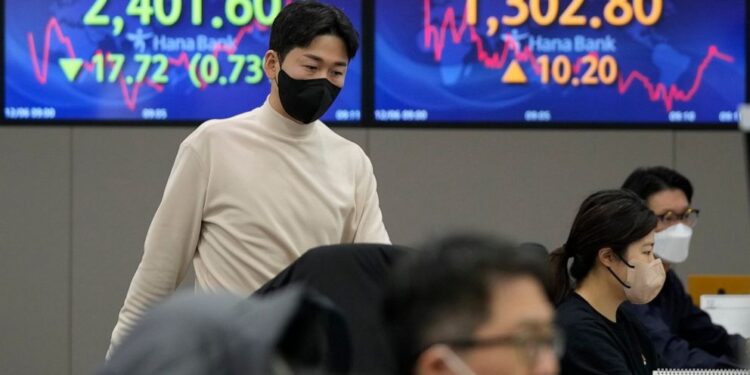Stocks are mostly lower in Asia after Wall Street pulled back as surprisingly strong economic reports highlighted the difficulty of the Federal Reserve’s fight against inflation
Stocks were mostly lower in Asia on Tuesday after Wall Street pulled back as surprisingly strong economic reports highlighted the difficulty of the Federal Reserve’s fight against inflation.
Tokyo rose while other regional markets declined. U.S. futures gained and oil prices also advanced.
Adding to worries over the potential for a recession, Fitch Ratings revised its forecasts for world economic growth downward on Tuesday to reflect the Fed and other central banks’ interest rate hikes.
Its Global Economic Outlook report estimated global growth at 1.4% in 2023, revised down from 1.7% in its September forecast. It put U.S. growth in 2023 at 0.2%, down from 0.5%, as the pace of monetary policy tightening increases.
China’s growth forecast was cut to a 4.1% annual pace from 4.5%.
Stocks were mostly lower in Asia on Tuesday after Wall Street pulled back as surprisingly strong economic reports highlighted the difficulty of the Federal Reserve’s fight against inflation.
Tokyo rose while other regional markets declined. U.S. futures gained and oil prices also advanced.
Adding to worries over the potential for a recession, Fitch Ratings revised its forecasts for world economic growth downward on Tuesday to reflect the Fed and other central banks’ interest rate hikes.
Its Global Economic Outlook report estimated global growth at 1.4% in 2023, revised down from 1.7% in its September forecast. It put U.S. growth in 2023 at 0.2%, down from 0.5%, as the pace of monetary policy tightening increases.
China’s growth forecast was cut to a 4.1% annual pace from 4.5%.
Stocks were mostly lower in Asia on Tuesday after Wall Street pulled back as surprisingly strong economic reports highlighted the difficulty of the Federal Reserve’s fight against inflation.
Tokyo rose while other regional markets declined. U.S. futures gained and oil prices also advanced.
Adding to worries over the potential for a recession, Fitch Ratings revised its forecasts for world economic growth downward on Tuesday to reflect the Fed and other central banks’ interest rate hikes.
Its Global Economic Outlook report estimated global growth at 1.4% in 2023, revised down from 1.7% in its September forecast. It put U.S. growth in 2023 at 0.2%, down from 0.5%, as the pace of monetary policy tightening increases.
China’s growth forecast was cut to a 4.1% annual pace from 4.5%.
The S&P 500 fell 1.8% Monday to 3,998.84. The Dow Jones Industrial Average lost 1.4% to 33,947.10 and the tech-heavy Nasdaq gave back 1.9%, closing at 11,239.94. Small-company stocks fell even more, sending the Russell 2000 index 2.8% lower to 1,840.22.
Oil and gas company stocks fell amid a broad pullback in energy prices, including an 11.2% slump in natural gas. Exxon Mobil fell 2.7%.
All told, roughly 95% of the stocks in the benchmark S&P 500 index were in the red, with technology companies, banks and retailers among the biggest weights on the market. Chipmaker Nvidia fell 1.6%, Bank of America slid 4.5% and Amazon dropped 3.3%.
Bond yields mostly climbed. The yield on the 10-year Treasury, which influences mortgage rates, rose to 3.59% from 3.49% late Friday.
Wall Street will get a weekly update on unemployment claims Thursday. November’s monthly report on producer prices is due Friday.
In other trading Tuesday, U.S. benchmark crude oil gained 63 cents to $77.56 per barrel in electronic trading on the New York Mercantile Exchange. It lost $3.05 to $76.93 per barrel.
Brent crude, the pricing basis for international trading, advanced 57 cents to $83.25 per barrel.
The U.S. dollar rose to 136.88 Japanese yen from 136.71 yen late Monday. The euro climbed to $1.0497 from $1.0491.
Source: abcNEWS



Recent Comments